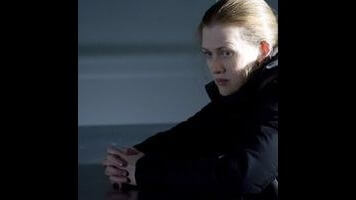The Killing: "Undertow"

Remember, if you can, way back in April 2011 when we all worried The Killing was going to be a lamer, derivative version of Twin Peaks?
If only.
Instead of painting a portrait of Rosie Larsen, delving into her inner life and personal troubles, The Killing has turned to increasingly outlandish plot twists in order to sustain itself another week. Each episode ends with a new, incriminating discovery, which, in short order the following week, is explained away as something innocuous. The show is all MacGuffins, with no narrative payoff.
The latest distraction is the apparent terrorism plot which, we discover in "Undertow" was not a terrorism plot at all—but an altruistic attempt by Bennet and Muhammad to help a 12-year-old Somali girl (Aisha, the same one we learned was missing a few weeks back) avoid a traditional marriage and ritual circumcision. The main purpose this serves is to make us all sadder when Stan and his twitchy lackey, Belko, beat the living daylights out of Bennet, which, inevitably, they do at the end of "Undertow." Bennet can’t just be innocent, he must be spectacularly so.
The terrorist thing also allows the writers to score some points for topicality by working in a Patriot Act reference—Holder’s judge friend won’t allow him to apply the law to a criminal investigation. Now, I love a good topical drama, but The Killing is taking a superficial approach to political and social issues. As an example, look no further than the scene where Darren visits the Green Lake Mosque and it’s covered in swastikas. Not that this kind of discrimination doesn’t occur in this day and age, but it all felt stagy and didactic, like a page from a picture book about tolerance: Discrimination is bad!
There’s also a glancing connection to the Richmond campaign: After Darren’s decision to go negative backfires, he decides he needs to shore up the Somali vote. He goes to Drexler and asks him for $5 million, which he plans to use to “rebuild the Somali community,” whatever that means. Drexler, cavalier guy that he is, tells Darren he can get the money if he makes a basket. Is it bad that I don't care if he makes it?
The Bennet dead end feels like an especially big waste of time because there are so many intriguing loose threads elsewhere in the narrative. Instead of leading us up this blind alley for weeks now, the show might instead have delved into Rosie’s relationship with her parents, or her self-loathing best friend, Sterling, or her creepy ex-boyfriend Jasper, or even—gasp!—with Bennet. What makes (fictional) murder interesting is the question of motive, and that’s exactly what we don’t have, nine hours into this series. We’ve just got a bunch of dead ends.
We’ve only got a few more episodes to go and, while I could still be surprised, I feel like The Killing is rapidly proving itself to be a missed opportunity. It started out as a creepy, smart procedural, but has morphed into something else. If I were to hazard a guess, I’d say that the writers are thinking of Rosie’s death as a stone thrown into a pond; everything we’ve watched up until has been the ripple effect. The Killing is less a posthumous portrait of Rosie than it is a study of how one death can tear apart many lives.
This would be a fine approach, in theory, if there were any kind of specificity to the world the show is portraying. There’s been a tremendous amount of focus on the mayoral campaign, but virtually everything about it feels like a cliché—I mean, hello, an intern sex scandal? Darren is also a generic type—the decent-guy-who-believes-in-public-service-struggling-to-retain-his-moral-dignity-yet-also-win-an-election—as are Mayor Adams and Jamie. The Somalis are at least a nod to Seattle’s (real-life) Somali community, but ultimately, this storyline is just a blunt statement about anti-Muslim sentiment. Like all the other characters on this show, they're just pawns in an overly schematic narrative. The Killing has opted for the political over the personal, and it's too bad.
And yes, the show certainly dabbles in the personal—as with Rosie’s family—but this, too, misses the mark. A big problem, as virtually every commenter has pointed out, is Michelle Forbes. I’ve tried to be patient but I can't lie: She is a liability, and I dread the droning, clenched voice she inevitably uses in her emotionally distressed scenes. The Killing has focused almost exclusively on the Larsen family's grief, and yet we've learned basically nothing about their life before the murder. At first, this portrait of mourning was touching; now, it's tedious (did we really need a scene where Stan interacts with a darling little girl in order to understand that he misses his daughter?) and, what's worse, seems like an elaborate way to avoid writing fully-realized characters. It’s incredibly strange that since the pilot, there’s been almost no discussion of what was going on the weekend when Rosie was killed, and Stan and Mitch didn't call their daughter for several days. Looking back on that first episode, it almost seems like a different series. If only it had stayed that way.
Stray observations:
- While Stan was punching Bennet, Belko was punching a rock. If he didn’t kill Rosie, then my name is Bennet Ahmed.
- The scene where all the kids walk out of class and the word “KILLER” is written on the chalkboard might be the most ham-fisted yet.
- The phone company needs 24 hours to trace Bennet’s incoming phone call, because this show is set in 1989.
- I know Linden is busy and all, but doesn’t it seem odd that she hasn’t done anything other than investigate Bennet—like looking into Stan’s mafia connections?
- Am I the last person on earth to figure out that Bennet's wife is played by Chrissy from Growing Pains?